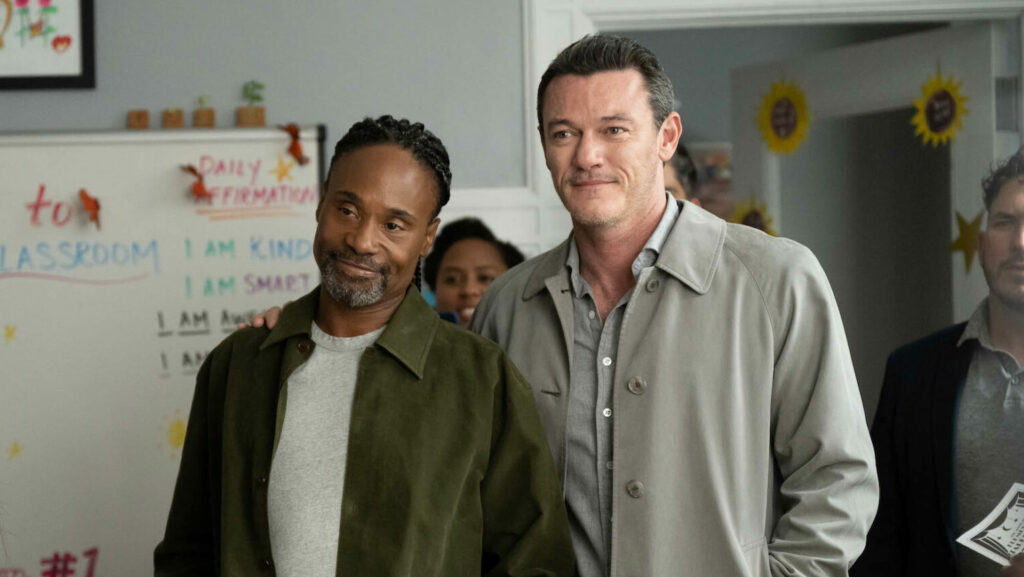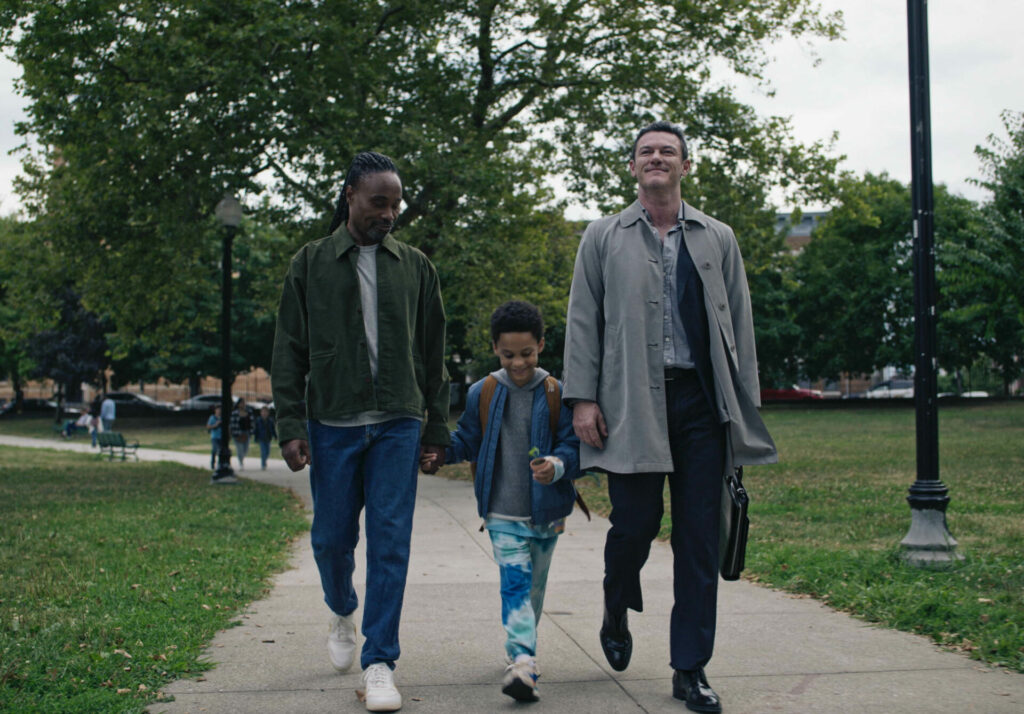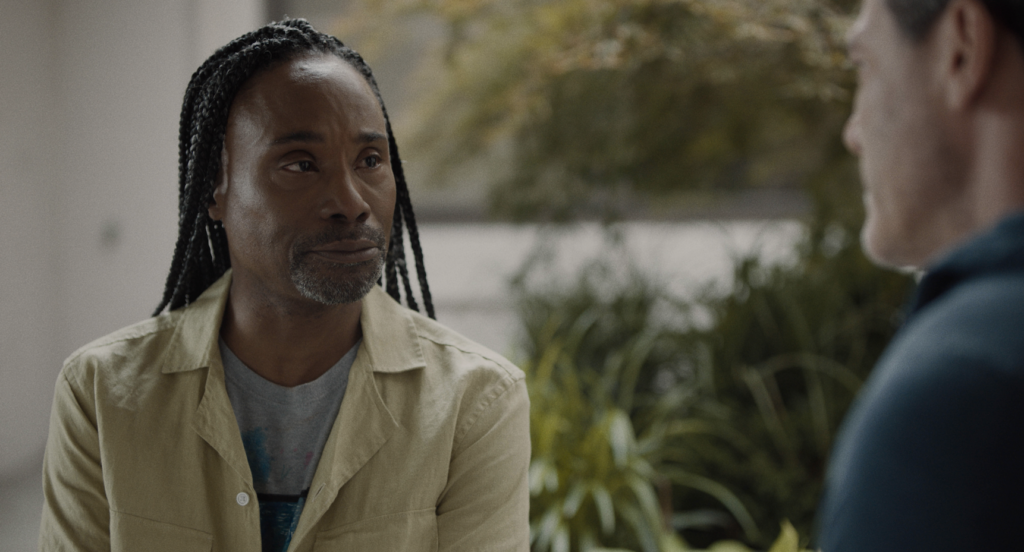Our Son’s Billy Porter and Luke Evans interview: ‘I couldn’t talk, couldn’t eat and cried after I left the set’
Exclusive: "The character is not fabulous - I'm not a one-trick pony," adds Pose star Billy, as he and Luke reveal all about their divorce drama film and their own experiences of relationship break-ups
By Simon Button

In new movie Our Son, Luke Evans stars as working father Nicky, and Billy Porter plays stay-at-home dad Gabriel, who have been together for 13 years and have an eight-year-old son.
When Gabriel drops the bombshell that he wants a divorce, the couple find themselves engaged in a custody battle in a film that Porter tells us “is not heteronormative, it’s human, period.”
Here, Attitude chats to Good Grief and Beauty and the Beast star Luke and Pose Emmy-winner Billy about same-sex divorce, queer actors playing queer roles and what it means to “rattle the cage” when life takes you places you don’t want to be.
What attracted you to this story and these roles?
Luke: I’d never read anything like this before from a gay perspective. It’s not about the joy of equality or marriage, it’s the opposite – namely the sad part of marriage when it breaks up. I’d seen it many, many times from the straight viewpoint but never from the gay side. Then dealing with the custody side of a breakup is a very traumatic story and a very universal one. It’s relatable, sadly, to so many people. You’ve either been through it yourself or you know somebody who’s going through it or has been through it. I just found it very refreshing, very real and I loved the writing. I’m always looking for those stories – gay or straight, whatever they are – that make people think and consider how alike we all are.

Billy: I’m 54 years old and as a queer man of a certain age I feel it’s time for something other than a coming-out story. I was on the front lines to fight for marriage equality and with marriage equality comes divorce equality too. We have the right to marry and we have the right to divorce, and these conversations need to be had in the public sphere. I feel like people come into your life for a reason, a season, and/or a lifetime. And what I love about this story is that there’s hope in it. It doesn’t always end like this. The parties involved aren’t always able to come back together in the way that we do in this movie. So that’s sort of what drew me to it, as well as fact that the character is not fabulous. He’s not a fabulous human being, he’s just a normal, regular guy. The world needs to see that I can play that too. I’m not a one-trick pony and I don’t want to be doing the same trick all the time. You know, there’s a lot of stuff in me and I want to explore it all.
There are some really raw moments. Were they tough to play?
Luke: Very. Sometimes you do films where you get these dark moments and you sort of just brush them off at the end of the day. But there were moments in this where, as a gay man, that was hard to do. I’ve been through breakups and they’re not pleasant at all. Nicky hopes and believes that he and Gabriel will get back together but he has to come to terms with the fact that it’s over. I related to it. I felt the pain and there were days where I was numb at the end of filming. I couldn’t talk, couldn’t eat and I cried after I left the set.

Billy: Luke and I had an immediate connection but those moments were hard because life imitates art. I was married when I was doing the film and I found myself having parallel conversations. So yes, it was really hard but I think that’s what makes it so beautiful, because we really leaned into the truth.
All of the cast were authentically chosen for their roles. How did that feel?
Luke: I thought it was wonderful that everybody was who they were in real life as well as on screen. Well, their on-screen jobs were different but it was so nice to be around an incredible group of LGBTQ actors. It was really special.
Billy: It was great because this is a little movie, so the focus and the energy of our queer writers and our queer director was to make sure that we were casting people who were authentic for these roles. That doesn’t mean that, you know, a straight person can’t play a queer person or that a queer person can’t play a straight person. I’m not saying that at all but in this instance, with this particular movie, it was good for us because I think we only had 19 days or something like that. So there was no finding it; you just had to be it because we got three takes and then we had to move on.
Did you like your respective characters?
Luke: I liked Nicky a lot and I understood him. Interestingly, when I was growing up me and my dad weren’t as close. My dad was the breadwinner, so he didn’t have as much time with me as my mum did. He was the one who went to work and he was the disciplinarian. I loved them both but I was a mummy’s boy. With Nicky, he’s the one who goes to work and he thinks he’s doing everything he should be as a father, then as the story progresses he’s forced to spend more time with his son and I found that beautiful. As I grew older, I understood my father much more and I respected him much more for the fact that he went out to work in the middle of winter, digging frozen foundations on a house up in the Valleys.
Billy: I love Gabriel because he’s complex, like we all are. And it’s a story about the complexity of what it is to be in a relationship, what it is to be in a marriage, what it is to have a child and what it is to give up everything, all of your dreams, for other people – which of course can be devastating when it doesn’t work out. I love Gabriel’s courage to rattle the cage, his courage to say: ‘This is no longer OK and it’s time for me to do something for me. And if I do this for me, I’ll be a better father to my son.’
Some critics have said the film is a heteronormative story in queer clothing.
Luke: In answer to that I’m like ‘Yeah, and the point it is?’ It hasn’t been done before and if we’d seen more of these queer stories that are non-sensational and are just about normal life it wouldn’t be remarked upon. What’s going on in Our Son happens all around the world between all sorts of couples and it’s only heteronormative because we haven’t seen it that much from our point of view. But it’s just two human beings navigating a very painful moment in their lives and trying to find a way through it – respectfully, sensitively, caring for this young life that they’ve brought into the world but now they’re going to have to do it separately. What I love about the film is that as painful and as traumatic as it is at times, there’s this very thin golden thread of hope through the whole thing.
Billy: Calling it a heteronormative story is where the conversation goes haywire for me. It’s not a heteronormative story. We can get married now and we’re human beings just like you. It is not heteronormative, it’s human, period. When do we start to have the conversation about human without all the other labels? The only label is human.
Our Son is in UK cinemas on Monday 25 March 2024.
